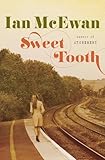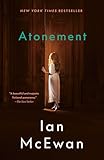 In Ian McEwan’s thirteenth novel, Serena Frome (rhymes with plume) is an assistant officer in MI5 who is part of a special project to fund writers who are critical of the communist utopia in 1970s — this is the soft cold war. The author she is running, T. H. Haley, who also becomes her lover, thinks that he is receiving the generous stipend from a private foundation, because he’s an up-and-coming writer with a lot of potential. In reality, it’s because he’s written some newspaper articles against communism. At one point, Serena reads one of Haley’s stories, which is “narrated by a talking ape prone to anxious reflections about his lover, a writer struggling with her second novel.” On the last page of the story, Serena learns that the narrator of the story is, in fact, the female writer in question. “The ape doesn’t exist, it’s a spectre, the creature of her fretful imagination.” Serena is revolted; she distrusts “this kind of fictional trick.”
In Ian McEwan’s thirteenth novel, Serena Frome (rhymes with plume) is an assistant officer in MI5 who is part of a special project to fund writers who are critical of the communist utopia in 1970s — this is the soft cold war. The author she is running, T. H. Haley, who also becomes her lover, thinks that he is receiving the generous stipend from a private foundation, because he’s an up-and-coming writer with a lot of potential. In reality, it’s because he’s written some newspaper articles against communism. At one point, Serena reads one of Haley’s stories, which is “narrated by a talking ape prone to anxious reflections about his lover, a writer struggling with her second novel.” On the last page of the story, Serena learns that the narrator of the story is, in fact, the female writer in question. “The ape doesn’t exist, it’s a spectre, the creature of her fretful imagination.” Serena is revolted; she distrusts “this kind of fictional trick.”
Without this kind of trick, Sweet Tooth, the large novel in which T. H. Haley’s own fictions are nestled like mirrors reflecting back upon reality, would fall apart completely. The tension between truth and duplicity lies at the heart of Sweet Tooth, which turns out to be a carefully constructed trick, as spectral, perhaps, as the ape in Haley’s story.

 Fabrication is a well-explored topic in McEwan’s fiction. Briony Tallis’s manipulation of real events into fiction lies at the heart of Atonement, while a very big lie forms the principal device in Solar’s elaborate climate change plot. Similarly, double duplicity is what drives Amsterdam to its tragicomic finale. In these novels, however, the fabrications become so elaborate that they begin to sound hollow. In order to raise the stakes and make the fiction more compelling, McEwan has been known to stretch his plots to the point of tearing. In Sweet Tooth, the stakes — a budding relationship, government money, one or two people’s jobs — are high enough to be interesting, but low enough for the novel to remain manipulative in a merely pleasant way.
Fabrication is a well-explored topic in McEwan’s fiction. Briony Tallis’s manipulation of real events into fiction lies at the heart of Atonement, while a very big lie forms the principal device in Solar’s elaborate climate change plot. Similarly, double duplicity is what drives Amsterdam to its tragicomic finale. In these novels, however, the fabrications become so elaborate that they begin to sound hollow. In order to raise the stakes and make the fiction more compelling, McEwan has been known to stretch his plots to the point of tearing. In Sweet Tooth, the stakes — a budding relationship, government money, one or two people’s jobs — are high enough to be interesting, but low enough for the novel to remain manipulative in a merely pleasant way.

 For the trick to pay off at the end, McEwan does require a certain amount of patience from the reader. If, like me, you expect the lush, thickly internalized prose of Saturday, the sparkling dialogues and quirky characters of On Chesil Beach, or even the atmospheric sense of dread of McEwan’s other spy novel, The Innocent, you will be disappointed. The principal reason for this lack is that, for Sweet Tooth to work, it needs to be told in the first person. While Serena Frome — a beautiful, blonde, romantic young woman who obtains a third in math at Cambridge and uses her photographic memory to devour novels — makes for an interesting character, she does not have a particularly compelling narrative voice. Her landscape is a little flat, her story is strictly chronological, her tone is chatty but cold. More importantly, she — or, I began to wonder as the novel progressed, perhaps McEwan himself — is obsessed with realism. The novel’s backdrop is the social and political crises in England in the 1970s: the IRA, the coal miners’ strike, the return of the Labor government in 1974. For a better part of the book, the narrator reminds us what decade we’re in regularly, defending herself if she’s acting against the norm, and explaining how the 70s were different from today when she isn’t.
For the trick to pay off at the end, McEwan does require a certain amount of patience from the reader. If, like me, you expect the lush, thickly internalized prose of Saturday, the sparkling dialogues and quirky characters of On Chesil Beach, or even the atmospheric sense of dread of McEwan’s other spy novel, The Innocent, you will be disappointed. The principal reason for this lack is that, for Sweet Tooth to work, it needs to be told in the first person. While Serena Frome — a beautiful, blonde, romantic young woman who obtains a third in math at Cambridge and uses her photographic memory to devour novels — makes for an interesting character, she does not have a particularly compelling narrative voice. Her landscape is a little flat, her story is strictly chronological, her tone is chatty but cold. More importantly, she — or, I began to wonder as the novel progressed, perhaps McEwan himself — is obsessed with realism. The novel’s backdrop is the social and political crises in England in the 1970s: the IRA, the coal miners’ strike, the return of the Labor government in 1974. For a better part of the book, the narrator reminds us what decade we’re in regularly, defending herself if she’s acting against the norm, and explaining how the 70s were different from today when she isn’t.
Being constantly hit on the head with historical facts can get a little frustrating; if you’ve read Atonement, you’ll know that McEwan can make history come to life without overstating it. Serena herself may offer an explanation for this narrative tic when she describes her own reading habits:
I craved a form of naive realism. I paid special attention, I craned my readerly neck whenever a London street I knew was mentioned, or a style of frock, a real public person, even a make of car. Then, I thought, I had a measure, I could gauge the quality of the writing by its accuracy, by the extent to which it aligned with my own impressions, or improved upon them.
This passage suggests that Serena’s obsession with historical accuracy as a narrator is a result of her own literary taste for hyperrealism, fiction that borders on fact. At least she practices what she preaches. Still, my resistance to this forced historicity raises an interesting caveat: how far should a writer stray away from what he does well, and what pleases the reader, in order to create a narrative voice that is consistent with the character? The answer, of course, depends entirely on the book.
When dealing with a writer as experienced as McEwan, however, one must be ready to give him the benefit of the doubt. I’m glad I did. A few months into Serena’s work at MI5, she receives a warning from a superior and one-time love interest (the word in the agency is that she’s more trouble than she’s worth):
In this work the line between what people imagine and what’s actually the case can get very blurred. In fact that line is a big grey space, big enough to get lost in. You imagine things — and you can make them come true. The ghosts become real.
Intelligence work sounds a little bit like writing novels, and McEwan proves that he’s sufficiently deft at the latter to navigate the grey space between fact and fiction without getting lost in it. In the end, Sweet Tooth is successful enough as a work of well constructed, brilliantly rendered fiction for Serena’s voice to work within the larger whole. The author remains so removed from his fiction that, once you understand what he’s up to, you have to strain to see him pulling the strings of the narrative.
Sweet Tooth purports by its content and its opening lines to be a spy novel, but it isn’t really. In a traditional spy/thriller/whodunit, the end reveal is never as interesting as the tension-filled pages of clues and red herrings that got you there. On the contrary, Sweet Tooth is a much finer novel in retrospect, once the final chapter and its revelations have been absorbed. Only then can the reader understand why the early elements in the book, characters shown for only a few pages and then quickly carried offstage, were there at all. These characters are carefully mentioned again throughout the book like touchstones for the plot’s unraveling, and are finally given their full purpose in the story. The novel’s ending, and its final question, turns the fiction back upon itself. Therein lies McEwan’s genius when he’s at the top of his form; he writes a novel like a jeweler cuts a diamond, by following the natural tensions in the raw material to create an object of admirable sharpness, perfection, and complexity. Like a diamond, the novel may not be to everyone’s taste, but its objective qualities are undeniable, nonetheless.








